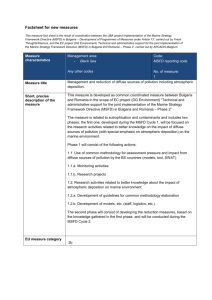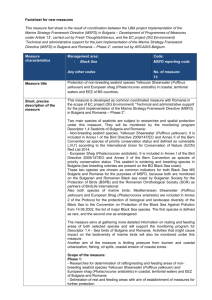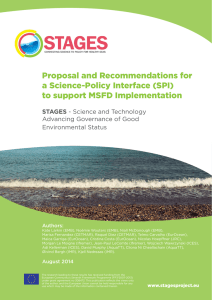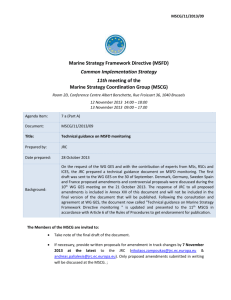Factsheet_4_FINAL3
advertisement
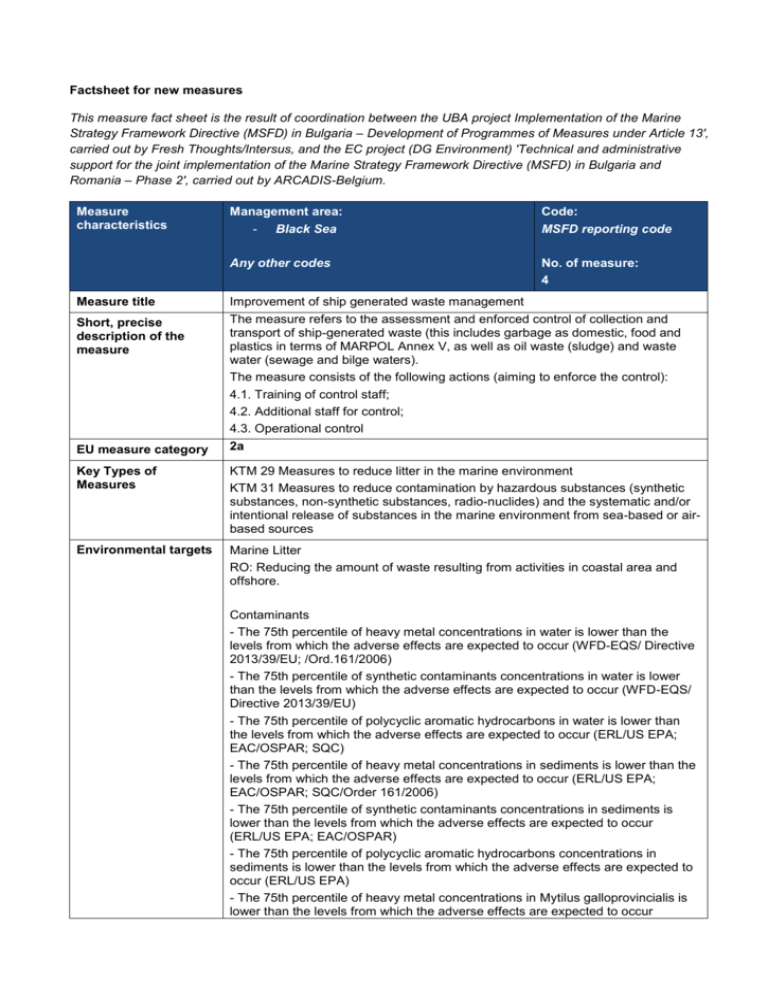
Factsheet for new measures This measure fact sheet is the result of coordination between the UBA project Implementation of the Marine Strategy Framework Directive (MSFD) in Bulgaria – Development of Programmes of Measures under Article 13', carried out by Fresh Thoughts/Intersus, and the EC project (DG Environment) 'Technical and administrative support for the joint implementation of the Marine Strategy Framework Directive (MSFD) in Bulgaria and Romania – Phase 2', carried out by ARCADIS-Belgium. Measure characteristics Management area: - Black Sea Code: MSFD reporting code Any other codes No. of measure: 4 Measure title Improvement of ship generated waste management Short, precise description of the measure The measure refers to the assessment and enforced control of collection and transport of ship-generated waste (this includes garbage as domestic, food and plastics in terms of MARPOL Annex V, as well as oil waste (sludge) and waste water (sewage and bilge waters). The measure consists of the following actions (aiming to enforce the control): 4.1. Training of control staff; 4.2. Additional staff for control; 4.3. Operational control 2a EU measure category Key Types of Measures KTM 29 Measures to reduce litter in the marine environment KTM 31 Measures to reduce contamination by hazardous substances (synthetic substances, non-synthetic substances, radio-nuclides) and the systematic and/or intentional release of substances in the marine environment from sea-based or airbased sources Environmental targets Marine Litter RO: Reducing the amount of waste resulting from activities in coastal area and offshore. Contaminants - The 75th percentile of heavy metal concentrations in water is lower than the levels from which the adverse effects are expected to occur (WFD-EQS/ Directive 2013/39/EU; /Ord.161/2006) - The 75th percentile of synthetic contaminants concentrations in water is lower than the levels from which the adverse effects are expected to occur (WFD-EQS/ Directive 2013/39/EU) - The 75th percentile of polycyclic aromatic hydrocarbons in water is lower than the levels from which the adverse effects are expected to occur (ERL/US EPA; EAC/OSPAR; SQC) - The 75th percentile of heavy metal concentrations in sediments is lower than the levels from which the adverse effects are expected to occur (ERL/US EPA; EAC/OSPAR; SQC/Order 161/2006) - The 75th percentile of synthetic contaminants concentrations in sediments is lower than the levels from which the adverse effects are expected to occur (ERL/US EPA; EAC/OSPAR) - The 75th percentile of polycyclic aromatic hydrocarbons concentrations in sediments is lower than the levels from which the adverse effects are expected to occur (ERL/US EPA) - The 75th percentile of heavy metal concentrations in Mytilus galloprovincialis is lower than the levels from which the adverse effects are expected to occur Measure characteristics Management area: - Black Sea Code: MSFD reporting code Any other codes No. of measure: 4 (Commission Regulations (EC) no. 1881/2006 and 629/2008 - The 75th percentile of synthetic contaminants concentrations in Mytilus galloprovincialis is lower than the levels from which the adverse effects are expected to occur (EAC/OSPAR) Descriptors D8 - Contaminants D10 – Marine litter Main pressures - Other physical disturbance/Marine litter Systematic and/or international release of substances Port activities Shipping Waste removal – other Main drivers Characteristics - Link to other directive/legislation/p olicy - Necessity for transnational regulation Link with Convention for the Protection of the Black Sea Against Pollution and its Protocols - possible need for change Instrument for implementation/ Mode of implementation - Marine and coastal birds Marine mammals Fish Benthic habitats Pelagic habitats Waste Framework Directive 2008/9/EC Port Reception Facilities Directive 2000/59/EC, as amended by Directives 2002/84/EC and 2007/71/EC and Regulation (EC) No. 137/2008 MARPO 73/78 Convention for the Protection of the Black Sea Against Pollution and the Protocol on the protection of the Black sea environment against pollution by dumping Legal Technical Economic Spatial reference/implementat ion zones Territorial waters/EEZ Contribution of the measure to achieving the target The measure will have positive effect on decreasing of total amount of waste entering into the Black sea marine environment, especially the percentage waste, originating from shipping. The measure will have a moderate contribution to achieving the targets. Transboundary impact The implementation of the measure is not expected to have negative transboundary impact on the waters of other countries shared the Black sea marine region. The measure will have positive effect on decreasing of total amount of waste entering into the Black sea marine environment especially the waste, originating from shipping. Measure characteristics Costs Management area: - Black Sea Code: MSFD reporting code Any other codes No. of measure: 4 First rough assessment: medium € 50.000-1.000.000 Administrative and implementation costs: 1) Additional staff for control (new working places, salaries, insurances): 63.000 € 2) Training of control staff: 1000 € 3) Operational costs for control (fuel, material, boat, repair costs): not possible to assess at this stage Total one off costs within MSFD cycle (6 years): not possible to assess at this stage (minimum 64.000 €, probably < 100.000 euro Scoring: Score total cost 1 > € 1 million 2 € 500.000 - 1 million 3 € 200.000 - 500.000 4 € 50.000 - 200.000 5 < € 50.000 Effectiveness Strong Indicator(s) to measure effectiveness Number of signals received / yearly Number of inspections / yearly Number of taxes / yearly Weight of different categories of waste for further processing in ports / yearly Socio-economic assessment Positive / Negative side effects: The implementation of the measure is not expected to have negative effects on the marine environment. Instead of that, the measure will contribute to decreasing of waste amount in it. Cost Effectiveness Assessment: Cost effective Cost Benefit Assessment: Medium Coordination Technical feasibility Body responsible for the measure implementation At national level Bilateral coordination between Bulgaria and Romania Regional measure in the scope of the Black sea Commission Frequently applied; extensive experience / evidence of good practice Bulgaria: Ministry of Environment and Waters (MoEW), Regional Inspectorates of Environment and Water - Varna and Burgas (RIEW - Varna and RIEW Burgas), Ministry of Transport, Information Technology and Communications and Executive Agency "Maritime Administration" - "Varna" Directorate and "Burgas" Directorate, port operators Romania: Ministry of Environment, Waters and Forests; Measure characteristics Management area: - Black Sea Code: MSFD reporting code Any other codes No. of measure: 4 Port Authorities, Environmental Protection Agency and Environment Guard Financing opportunities Planning of implementation/tempo ral coverage Difficulties in implementation Public funds; EU projects (i.e Horizon 2020 Program) 2017 No Supporting information for SEA Additional values for protection (outside MSFD) Reasonable alternatives
